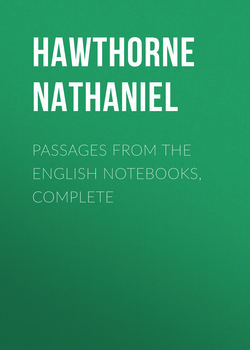Читать книгу Passages from the English Notebooks, Complete - Hawthorne Nathaniel - Страница 10
VOL. I
PASSAGES FROM HAWTHORNE'S ENGLISH NOTE-BOOKS
NEWBY BRIDGE. – FOOT OF WINDERMERE
ОглавлениеJuly 13th. – I left Liverpool on Saturday last, by the London and Northwestern Railway, for Leamington, spent Sunday there, and started on Monday for the English lakes, with the whole family. We should not have taken this journey just now, but I had an official engagement which it was convenient to combine with a pleasure-excursion. The first night we arrived at Chester, and put up at the Albion Hotel, where we found ourselves very comfortable. We took the rail at twelve the next day, and went as far as Milnethorpe station, where we engaged seats in an old-fashioned stage-coach, and came to Newby Bridge. I suppose there are not many of these coaches now running on any road in Great Britain; but this appears to be the genuine machine, in all respects, and especially in the round, ruddy coachman, well moistened with ale, good-natured, courteous, and with a proper sense of his dignity and important position. U – , J – , and I mounted atop, S – , nurse, and R – got inside, and we bowled off merrily towards the hearts of the hills. It was more than half past nine when we arrived at Newby Bridge, and alighted at the Swan Hotel, where we now are.
It is a very agreeable place: not striking as to scenery, but with a pleasant rural aspect. A stone bridge of five arches crosses the river Severn (which is the communication between Windermere Lake and Morecambe Bay) close to the house, which sits low – and well sheltered in the lap of hills, – an old-fashioned inn, where the landlord and his people have a simple and friendly way of dealing with their guests, and yet provide them with all sorts of facilities for being comfortable. They load our supper and breakfast tables with trout, cold beef, ham, toast, and muffins; and give us three fair courses for dinner, and excellent wine, the cost of all which remains to be seen. This is not one of the celebrated stations among the lakes; but twice a day the stage-coach passes from Milnethorpe towards Ulverton, and twice returns, and three times a little steamer passes to and fro between our hotel and the head of the lake. Young ladies, in broad-brimmed hats, stroll about, or row on the river in the light shallops, of which there are abundance; sportsmen sit on the benches under the windows of the hotel, arranging their fishing-tackle; phaetons and post-chaises, with postilions in scarlet jackets and white breeches, with one high-topped boot, and the other leathered far up on the leg to guard against friction between the horses, dash up to the door. Morning and night comes the stage-coach, and we inspect the outside passengers, almost face to face with us, from our parlor-windows, up one pair of stairs. Little boys, and J – among them, spend hours on hours fishing in the clear, shallow river for the perch, chubs, and minnows that may be seen flashing, like gleams of light over the flat stones with which the bottom is paved. I cannot answer for the other boys, but J – catches nothing.
There are a good many trees on the hills and roundabout, and pleasant roads loitering along by the gentle river-side, and it has been so sunny and warm since we came here that we shall have quite a genial recollection of the place, if we leave it before the skies have time to frown. The day after we came, we climbed a high and pretty steep hill, through a path shadowed with trees and shrubbery, up to a tower, from the summit of which we had a wide view of mountain scenery and the greater part of Windermere. This lake is a lovely little pool among the hills, long and narrow, beautifully indented with tiny bays and headlands; and when we saw it, it was one smile (as broad a smile as its narrowness allowed) with really brilliant sunshine. All the scenery we have yet met with is in excellent taste, and keeps itself within very proper bounds, – never getting too wild and rugged to shock the sensibilities of cultivated people, as American scenery is apt to do. On the rudest surface of English earth, there is seen the effect of centuries of civilization, so that you do not quite get at naked Nature anywhere. And then every point of beauty is so well known, and has been described so much, that one must needs look through other people's eyes, and feels as if he were seeing a picture rather than a reality. Man has, in short, entire possession of Nature here, and I should think young men might sometimes yearn for a fresher draught. But an American likes it.
